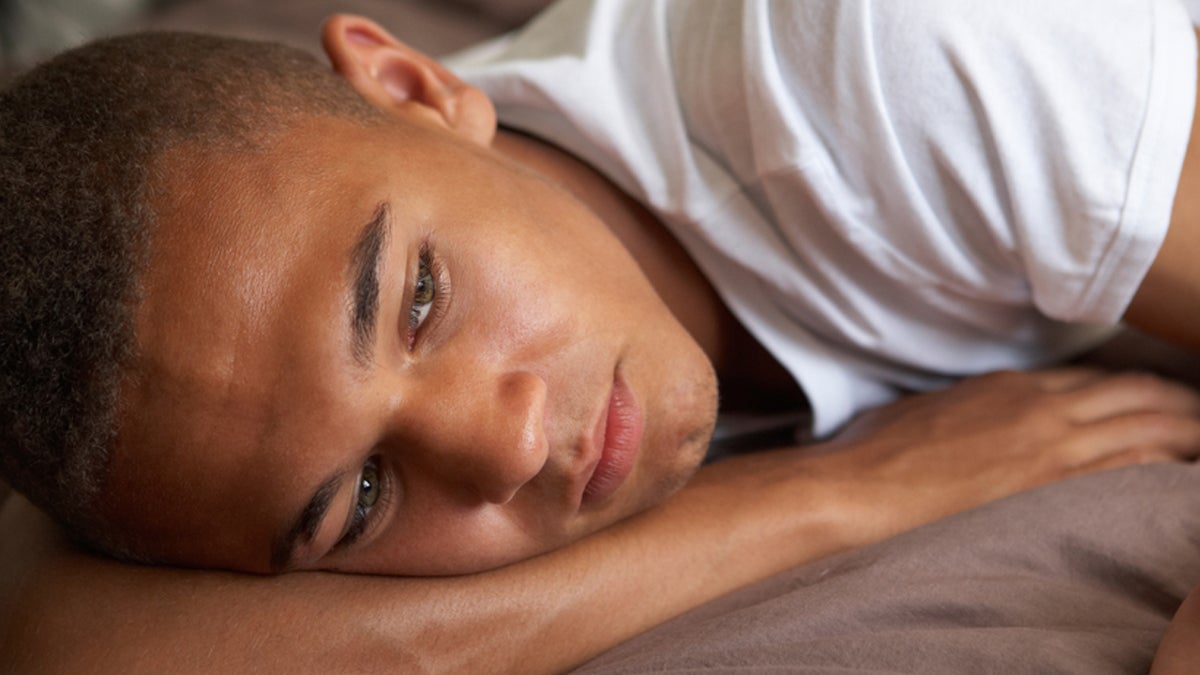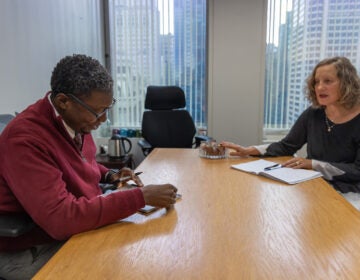Too many LGBT youth depend on abusive relationships for a home
Working with LGBT youth, I witness them struggle to cope with abusive partners daily. The thing I hear over and over is: "I want to leave him, but I have nowhere else to go."

(Depressed teenage boy image courtesy of Shutterstock.com)
Speak Easy is examining priorities among LGBT communities in the Philadelphia region that persist beyond the issue of same-sex marriage. Seeking diverse perspectives on these issues, NewsWorks is hosting a public forum, “LGBT Priorities Beyond Marriage,” on Sept. 15 at WHYY studios. Registration is free at whyy.org/speakeasy.
—
For the LGBT community, marriage equality is a huge win and further establishes that we are worthy of the same rights as everyone else. However, in my own reality, marriage has not been on the top of my list of priorities.
Working at Camden Area Health Education Center with LGBT youth, primarily YMSM (young men who have sex with men) of color, I witness them struggle to cope with abusive partners daily. The thing I hear over and over is: “I want to leave him, but I have nowhere else to go.” It is disheartening to know that these young people have to endure life-threatening situations just to have a place to sleep at night.
I myself have fallen victim to interpersonal violence and, until this moment, have never really spoken about it. At the age of 18 I found myself living with a guy I had only known for about six months, cutting classes, eventually dropping out of college, and abusing alcohol and marijuana daily.
During the first six months I didn’t notice, but this guy was already luring me with controlling mechanisms, and I naively thought he only wanted the best for me. It began with him telling me how much he wanted to see me and talk to me, so I’d always make myself available, either on the phone or in person at his house. As the relationship progressed, his feelings of “missing me” became manipulations, forcing me to be available at all times or suffer accusations of infidelity and being a “whore.” I felt so obligated to prove my (what I believed was) love for him, that I eventually left school, Camden, and my family behind to move in permanently with this guy so that I could avoid “hurting him.”
Within a month of moving in, he was already cursing at me and talking down to me regularly. I just believed it was my fault; I was doing the wrong thing; I needed to somehow fix myself. I fell into a period of self-doubt, insecurity and embarrassment — at this point, I realized something was not right.
As the insecurity and self-doubt grew, so did my use of alcohol and marijuana, which led to verbal altercations. When I drank or smoked, I felt more confident to speak out against the way I was treated. I guess he saw this as a compromise of his control, so the verbal abuse became physical.
Eventually I was able to pull myself out of this situation with the help of close friends and the independence I gained when I found a job and had my own income. The transition was not fast, however, and there were even more physical assaults as a result of my working and his fear of me leaving. I hid black eyes and bruises at work.
After I finally found my own place to live, a co-worker drove me to the guy’s house, and I packed my things into two trash bags (he had cut up and thrown away most of my things in one of his fits) and finally left.
Time is said to heal all wounds. However, to this day, I still feel moments of regret, self-doubt and fear when I randomly flash back of one of those traumatic moments. Luckily, though, I was able to find a way to channel those negative thoughts and feelings through the work I do with youth.
I currently work with two clients in particular who are in situations that are very abusive in every sense and have both recently been life-threatening as well. They both have partners they depend on for living space and feel they have no other choice at the moment, as they are both over the age of 21 and have aged out of shelter support — and that’s from shelters that are willing to help LGBT youth.
There aren’t any shelters specifically for victims of same-sex interpersonal violence. Honestly, there is barely support for male victims of interpersonal violence.
Both of these clients have had to go to the hospital and stay there because of injuries inflicted by their partners, and neither has had any follow-up counseling through those experiences. Luckily there is support from their friends and us here at Camden AHEC.
Apart from the obvious physical results, I also feel that the risk of HIV infection is greatly increased in relationships where interpersonal violence is present. And YMSM of color are already at greater risk. Halting interpersonal violence and curbing its prevalence within the LGBT community needs to become a priority.
—
As a health educator at Camden Area Health Education Center, Christian Hill has worked primarily with LGBT youth from Camden City and its surrounding areas for over three years, specializing in HIV prevention. He coordinates Project K.I.S. (Keeping It Safe) for YMSM (young men who have sex with men). Christian is a former client of the Camden AHEC drop-in center. He was hired as a peer health educator, during which time he gained a passion for educating his peers about HIV prevention and discussing other issues faced by YMSM. Christian now majors in human services at Thomas Edison College, with the goal of becoming a counseling psychologist for LGBT youth as well as same-sex couples, while also studying to become a case manager at Rutgers University.
WHYY is your source for fact-based, in-depth journalism and information. As a nonprofit organization, we rely on financial support from readers like you. Please give today.



